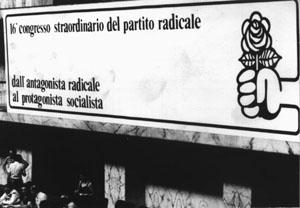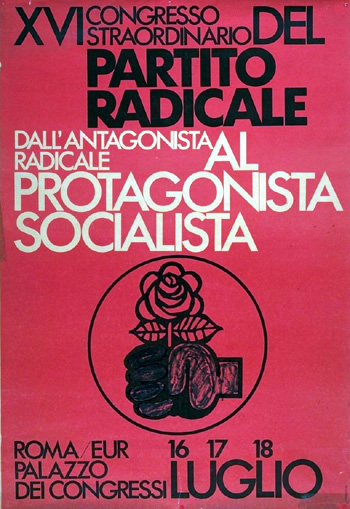|
|
|
For the early Italian national elections of June 20, 1976, the Radical Party presents its own list of candidates throughout the entire country for the first time in its history. At the end of a dramatic electoral campaign - including Pannella's first total hunger strike in order to get a more equal division of television time among the political parties - the Radical Party attains the minimum vote and wins four seats in the Chamber of Deputies. Just after this historic turning point in the life of the party, the Radicals hold their XVIth Congress (Extraordinary) in July in Rome. The most important decisions regard the structuring of the party and public financing. The policy that emerges from the work of the Congress is for "scientific disorganisation". Not to overburden the federal party with responsibilities, but to foster battle actions everywhere in the country. Furthermore, the Congress confronts a question posed by the new institutional situation: that of public financing. The motion of the Congress sets a first firm point in what will subsequently be a series of approximations: not to use public financing funds for party structures.
 The
XVIth Congress (Extraordinary) of the Radical Party, held in Rome July
16,17,18 greets the 400,000 voters who voted Radical, the thousands
of new active members and the hundreds of new associations that were
formed during the election campaign. The
XVIth Congress (Extraordinary) of the Radical Party, held in Rome July
16,17,18 greets the 400,000 voters who voted Radical, the thousands
of new active members and the hundreds of new associations that were
formed during the election campaign.While representation in Parliament is the conquest of a new instrument for bringing its battles into the institutions themselves, the Radical Party knows that four of its comrades in Parliament is not what is going to change the Italian political situation or bring victory to the strategy for an alternative unless there does not continue to exist in the country a stronger and more aggressive party of civil disobedience, of non-violence, of the tools of direct democracy, of referendums.With these characteristics and these methods, which have heretofore marked its political actions, its initiatives and its successes, the party will again take up and develop its intransigent opposition to the regime. The Congress denounces the corporative and power-sharing politics that has been extended to the two major elected assemblies, the restrictive interpretation of parliamentary regulations that evidently confirm the desire to reduce the Parliament to mere registries for decisions made outside of it, the practice of discrimination against the Radical and Proletarian Democrat parliamentary groups in the composition of parliamentary organs which is a continuation of past discrimination against minorities not represented in Parliament and extra-parliamentary groups. The search for common ground between the Christian Democrats and leftist parties and the efforts being made to find new political balances for governing distract the left from their urgent duty to prepare and assure a common alternative program which is the only road for overcoming the grave institutional, political and economic crisis that invests the country. In spite of all this, the Radical Party believes that the June 20 elections, with the strengthening of the left, have created at least the numerical conditions for a possibly successful, short-term legislative action for a reform of the entire juridic order towards the creation of a fully democratic State. Unitary Referendums in 1977 The Radical Party must prepare to propose again, in 1977, a series of abrogation referendums, that with a vast mass consensus will make it possible to pursue such legislation in Parliament. The Congress extends its fraternal greetings to its comrades of the PSI who are about to confront a laborious and difficult intra-party debate. The Radical Party will follow this debate with attention and a mind open to all forms of collaboration in the hope of finding very soon a thoroughly reformed PSI ready to participate in the necessary and urgent re-establishment of the libertarian Socialist component of the Italian left. While hoping it will be possible to have a theoretical and political debate free of prejudice between the PSI and the Radical Party, the Congress hopes that the first contribution of the Radicals to such a re-establishment will be to strengthen the Socialist and libertarian organisation of the Radical Party, the MLD, the Civil Rights Movement and in a word the varieties of Socialism that on June 20 also began to find an electoral expression as a pole of attraction of new Socialist groups in the face of the distribution and dispersion of the Socialist sphere and their progressively growing incorporation into the PCI's structures and sphere of influence. The XVIth Congress extends its greetings to its comrades of the Italian Communist Party who are fighting for the creation of a freer and more just society; it confirms the willingness of the Radical Party, already expressed at the Florence Congress, to enter into a political debate with the PCI to probe their real motives of dissent and opposition and remove them form the sphere of insult and invective which is incompatible between parties who have found and ought still to find significant points of agreement in the battles of the country's left wing. The Congress, to conclude, confirms its will for a constructive dialogue for unity with the parties and movements allied with the Proletarian Democrats. Self-run Initiatives and Associations The participation in the elections accelerated and multiplied the broadening and strengthening of the Radical Party's organisation: 1) the number of members, unregistered supporters and Radical associations more than doubled; 2) the new situation regarding Radical associations that has been formed creates conditions that permit the formation of regional Radical Parties as foreseen in the statute in almost all regions of the country; 3) in the big cities, and particularly in Rome, the new dimensions allow for a new quality in the Radical organisation and presence; 4) lastly, the possibility of autonomous association initiatives opens up in new sectors of political action and intervention where the Radical Party has not been active before. This organisational development of the party must be realised according to the statute's libertarian, self-administrating and federative norms. It is necessary to block the rejection and foster the acceptance of the new energies and potentialities of the militants, so much more ample than before the elections, by the national and already existing regional structures of the party and its associations in the various cities. It is necessary to disorganise the party's praxes, in its tools and its statutes, to allow for new organisation and new development beginning with the new situation regarding militants and associations that is being created, according to the following lines: that they give themselves agile tools for organisation, information and service; regional parties that also concentrate on a few communal activities and for the rest, tasks of co-ordination and service to foster the creation and development of multiple association experiences entrusted to the self-management of the old and new activists. Regional Parties for October In order to foster this process, the XVIth Congress of the Radical Party must be considered the first step in preparing the ordinary Congress in November. The Federative Council, the assemblies of all the associations, the regional congresses, according to the time schedules foreseen in an accompanying motion, will be the central factors of this pre-congressional preparation, which should bring the following contributions to the national Congress: - the policy proposals; - the mass initiatives of direct democracy that ought to be party commitments in '77; - the norms for implementation of the statute for the running of the party; - all of the proposals contained in the party Secretary's report, the reports of the commissions and the other Congressional acts. The XVIth Congress (Extraordinary) takes note of the debate and the conclusions of the Commission on "Implementation of the Statute and Organisation of the Regional Parties"; and in relation to the need of guaranteeing adequate preparation of the Ordinary Congress of next November, gives a mandate to the National Secretary to distribute the results of the commissions themselves to the associations and regional parties so that the Federative Council, in a meeting for that purpose, can evaluate the proposals, in previous discussion, on the party's structure, on membership and on modifications of the Statute. The XVIth Congress of the Radical Party forms a commission of five members to examine the statutes of the regional Parties and associations so that the Federative Council can analyse their characters and political significance. Therefore the Congress sets the organisational schedules for the following months: - by August 10 the distribution of the Congressional acts to all active members and supporters of the party; - by the end of July a meeting of the Federative Council to examine and set up the pre-Congressional debate; - during the first week of September a meeting of the Federative Council amplified to include the representatives of the local associations for the debate and the organisation of the Congress and to examine the problem of the constituency elections; - by September 15 the meetings of all the associations assemblies to approve the statutes of association and for the pre-congressional debate; - by October 24 the meeting of all the regional congresses for the approval of the statutes and the pre-congressional proposals. Why We Say "No" to Public Financing of the Party The XVIth Congress (Extraordinary) of the Radical Party furthermore deliberates the reconfirmation of the decision, made by the Federative Council last July 5, to refuse ordinary public financing of the parties. In reaffirming the principle of self-financing of political groups, it gives a mandate to the National Secretary to provide for the formation of a working group to present to the Congress, with the previous approval of the Federative Council, a bill to replace the present one, whereby the State provides the necessary services for the political activities of the parties and not for sustaining the bureaucratic apparatus and the equal reimbursement for the elections to all parties that have presented their lists in all the constituencies, winning minimum results still to be determined. Gives a mandate to the National Secretary to receive the part of the public financing of parties that is due to the Radical Party, in order to avoid its redistribution among the other parties and to freeze it in a special fund that will be blocked until the revision of the law according to the principles described above and to actuate all the struggles (including the call for an abrogation referendum) to reach this goal. In conclusion, gives a mandate to the National Secretary to collect the quota of the reimbursement for election expenses to the Party and the National Treasurer in collaboration with the treasurers of the regional parties, to define the criteria and the amounts for the division of the money to cover the effective debts among the Federal Party and the regional parties and associations taking into account the final balances that must be presented by August 30 to the Treasury of the Federal Party duly signed and documented according to the unified schemes already prepared, as well as the common operating needs of the actions to be undertaken at both local and national levels. |
